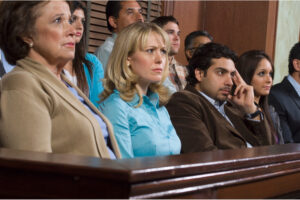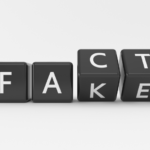Boredom in the Jury Box
My college roommate and one of my best friends is the smartest person I know. While I tried my hand at DJing in the college radio station, she mastered organic chemistry. We often discussed life’s most interesting problems, political theories, or cultural changes while sitting across from each other on our dorm room’s twin beds. She’s now a brilliant anesthesiologist and a world-class mother. Here’s one quick story to further illustrate her mental capacity. I was visiting when she went into labor with her first child. She calmly came downstairs, announced she was in labor, signed a contract for a new job, took food from the freezer to thaw, and said goodbye as if she were going to the beach. She then asked her husband to grab the library books on the counter so they could return them on the way to the hospital. Do you get the picture?
Yet now, when we talk about what we are reading or watching, you will not find a single thread of intelligence. If I even suggest a book with a little complexity, there’s an immediate reaction that neither of us has the capacity for that. We can text for hours about shows like “Survival of the Thickest” or “Ted Lasso,” but neither of us can muster the desire to debate politics or climate change. There should be a word for smart, accomplished, former bookworms/self-proclaimed nerds who’ve lost the capacity to use their intellect outside work or home.
 As a trial lawyer, I wonder if jurors may suffer the same intellectual fatigue. Like doctors and lawyers, many professionals spend all day using their brains, reading and analyzing, and there’s little left for those few precious moments of relaxation. Every time I interviewed jurors as a reporter or talked to jurors after my own trials as a lawyer, they always said they wished the lawyers would hurry things up or try to make things more interesting. Thinking they are handing me a huge compliment, jurors sometimes say, “Oh, I liked you a lot better because you didn’t talk as much as that other guy.” If you don’t have the luxury of having Johnny Depp or Alex Murdaugh as a client, do you need to add in a little Hollywood just to keep the jury interested?
As a trial lawyer, I wonder if jurors may suffer the same intellectual fatigue. Like doctors and lawyers, many professionals spend all day using their brains, reading and analyzing, and there’s little left for those few precious moments of relaxation. Every time I interviewed jurors as a reporter or talked to jurors after my own trials as a lawyer, they always said they wished the lawyers would hurry things up or try to make things more interesting. Thinking they are handing me a huge compliment, jurors sometimes say, “Oh, I liked you a lot better because you didn’t talk as much as that other guy.” If you don’t have the luxury of having Johnny Depp or Alex Murdaugh as a client, do you need to add in a little Hollywood just to keep the jury interested?
I don’t propose to have a solution except to be mindful that jurors and readers are juggling the same busy lives we all are. Brevity, when possible, can be incredibly effective. Varying witnesses, the pace of cross-examination, or not belaboring every single point may gain jurors’ attention. While it’s not easy to make a business litigation case or average breach of contract case highly interesting, I believe taking these small steps is part of an attorney’s overall advocacy. I’m not the most skilled PowerPoint presenter, but I am a visual learner, and the opportunity to put a visual or demonstrative in front of a jury can be powerful.
I’m not advocating for dramatic flourishes or a song and dance in front of a jury, but as a journalism mentor once told me, scatter golden coins throughout your presentation to ensure the viewer is engaged and paying attention. As I think about my own intellectual fatigue, especially during trial, it’s a good reminder that even the smartest jurors would perhaps appreciate a more engaging rendition of the law and facts.
©[dapaimages]via Canva.com





